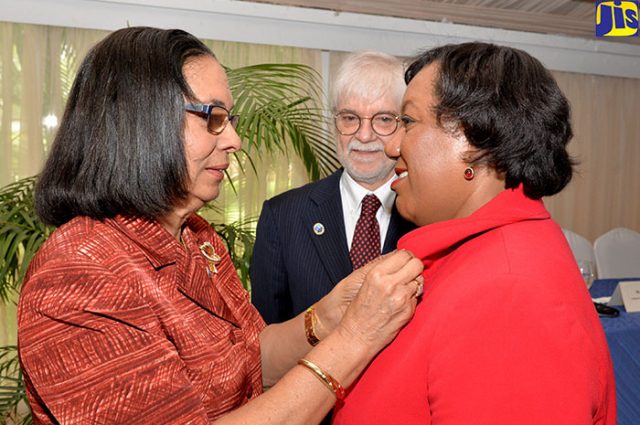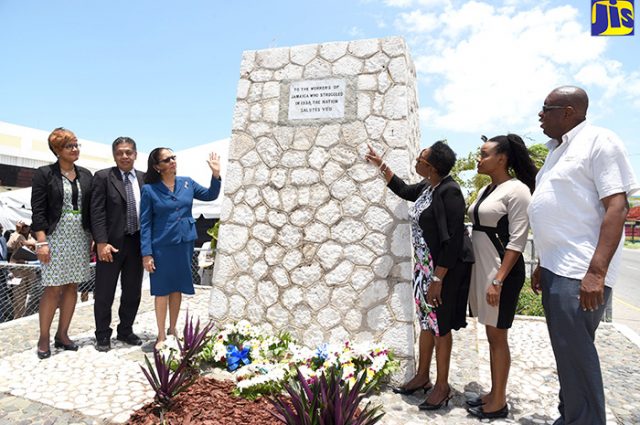Productivity is one of the key factors constraining Jamaica’s economic growth and living standard. Therefore, improvement in productivity is a strategic means to enhance competitiveness and economic growth.
Generally speaking, it is desirable for real wages to increase in order to improve the standard of living as well as reduce poverty. However, increase in real wages without a corresponding increase in productivity could give rise to inflationary pressures, erode international competitiveness and diminish our ability to attract foreign investment.
Productivity-linked wage system (PLWS) and performance-incentive system are used interchangeably in this article. PLWS is a compensation framework which seeks to establish a practical link between wages and productivity, or between performance and compensation. Such linkage results in greater flexibility and dynamism in setting wages. The three most widely used,and simplest to apply, PLWS are the: profitability model, productivity model and a combination of profitability and productivity models.
The profitability model is made up of a fixed component (basic salary and annual increment) combined with a variable component determined by a profit-sharing formula.This variable component will be paid when the profits earned by the company exceed a predetermined level. This level of profit can be calculated based on return on investment and average profits earned in the past several years.
The productivity model is comprised of a fixed component (basic salary and increment) plus a variable component determined by a productivity sharing formula. Productivity can be measured as labour productivity, capital productivity, total factor productivity or a weighted average of several key performance indicators. The idea is to keep the productivity measure as simple as possible to get worker buy-in.
The combined model consists of a fixed component (basic salary and increments) plus variable components consisting of profit and productivity sharing formulae. The combine model serves to make the point that a business can be profitable because it can manipulate prices, but not productive.
PLWS aims to encourage employers and employees to pursue higher levels of productivity or performance as a viable and sustainable source of higher real incomes for workers and higher revenues and profits for enterprises. PLWS is concerned with developing a compensation framework in which employees attain increased levels of income if their team, department, or entire company reaches some specified performance targets. It is generally conceptualised as a motivational tool aimed at persuading employees to work more diligently- bringing benefits to the business and at the same time providing added income for the worker. PLWS not only account for individual performance, but also performance of teams. This can be a valuable benefit, as knowing that compensation increases can be based in part on the performance of the team will often encourage employees to operate as a cohesive unit in order to reach a common goal.
PLWS ensures that workers are paid based on productivity or performance, as opposed to hours spent on the job at a fixed salary. It sees to the development of a systematic and flexible compensation framework which improves both productivity and wages, while ensuring that wages are not rising faster than productivity. Furthermore, a flexible compensation system avoids labour shedding during periods of economic downturn.
PLWS ensures that employees obtain a fair share from productivity growth and performance improvement by rewarding workers for their contribution on the successful achievement of strategic goals. It assists in recruiting and retaining the best employees by engaging them to participate in and contribute to the organisation’s success. Finally, PLWS communicates and reinforce the values, goals and objectives of the company.
The benefits of implementing a PLWS include: (a) payment of wages that will be adjusted according to performance instead of paying for time spent on the job. In so doing, it offers an incentive for workers to step up their effort levels. It therefore represents a potential mechanism through which to bring about overall productivity improvements; (b) ensuring employment stability and reducing the probability of workforce retrenchment during an economic slowdown; (c) creating a win-win situation for employees and employers as gains in performance are shared; (d) enabling companies to adjust their compensation according to prevailing economic conditions; (e) improving job specialisation according to skill; (f) enhancing the career of employees; and (g) improving employees’ motivation and job satisfaction.
There is a growing body of empirical evidence confirming that when carefully designed and managed, PLWS can, and often do, induce workers to work harder and smarter and to use existing technologies in new and better ways to enhance productivity.
In addition to the above general benefits, the case study of the bauxite/alumina industry in Jamaica highlights practical quantitative and qualitative benefits of successfully implementing a performance incentive scheme. This case is documented by Michael O Mitchell, formerly of the Jamaica Bauxite Institute, in the Book Chapter titled: “Productivity Improvement in the Jamaican Bauxite / Alumina Sector”edited by Imonitie C. Imoisili and Andre-Vincent Henry.
Mitchell notes that because of the performance incentive scheme in the bauxite/alumina industry, there was an overall improvement in critical quantitative indicators such as: production, unit costs of production, unit operating costs and unit labour cost.
Mitchell also observed that there were five qualitative benefits emanating from implementation of the performance incentive scheme in the Jamaican bauxite/alumina sector:First, the productivity incentive scheme created a great deal of excitement among workers and managers in several other sectors and industries and, in fact, became a standard for labour management cooperation in Jamaica. Several private and state run companies requested and were given the bauxite/alumina template.
Second, there was a significant increase in worker morale which has translated into heightened awareness of performance at the various plants and work sites.
Third, marked improvement in workplace transparency was one of the most pronounced feature in the work environment. This resulted from the practical need to share information with workers that was previously treated as confidential. This opened the way for new confidence and trust on the part of the workforce.
Fourth, apart from the renewed confidence, the real knowledge about plant performance and the workers’role in affecting outcomes has raised worker consciousness far above what the normal training programmes could have accomplished.
Fifth, coupled with the greater degree of transparency was the enhanced participation of workers in decision-making processes such as reviewing past results, setting of production targets for outputs, unit cost, raw material use, health, safety and environmental practices.
In light of the foregoing, it is reasonable to recommend that Jamaican companies seek to improve their productivity and competitiveness by benefiting from what we currently know about PLWS. Indeed, as far back as 1998 Professor Donald J. Harris & Ute Schumacher from Stanford University suggested that PLWS or productivity incentive schemes, have been promoted by both employer and employee representatives as offering significant potential for productivity improvements in Jamaica.
Research carried out on the effectiveness of PLWS in Malaysia showed that companies that have successfully implemented the strategy boosted productivity levels at the workplace, thereby contributing to economic growth and development. Specifically, 24 per cent of Malaysian companies implemented the PLWS and contributed a 15 per cent increase to productivity.
As at 2016, over 78,000 companies in Malaysia implemented PLWS benefiting some 3.3 million workers. The service sector was the biggest implementer with 58,067 employers adopting the system followed by the manufacturing sector (10,067), construction sector (5,258), and the agricultural sector (3,901).
It is hoped that this article will accelerate and deepen the conversation about PLWS as a mechanism for promoting productivity and competitiveness in Jamaica. In particular, it is expected that this conversation will enable all parties: especially government, employers, employees and trade unions to enhance their understanding of the concepts, objectives, potential benefits, and best practice implementation strategies that are applicable to different organisations. A one size fits all approach will not work!
– Charles Douglas is executive director of the Jamaica Productivity Centre
Source: http://jamaica-gleaner.com/article/news/20180618/school-productivity-campaign-performance-linked-wage-system-can-boost


 04
04  04
04  04
04  22
22  18
18  18
18  30
30  21
21  21
21